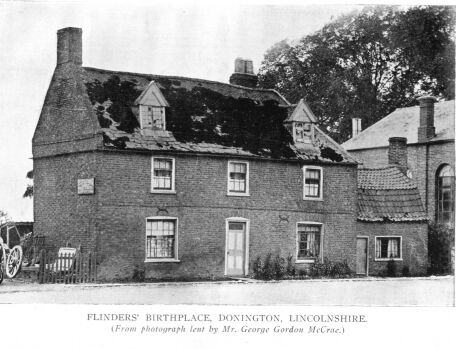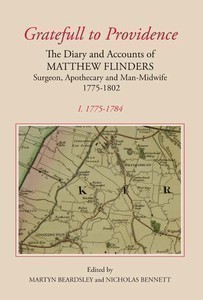
September 5, 2014, by Lucy
Getting into the archive: Lincolnshire and Matthew Flinders’ diaries
Lincolnshire Archives
This week I started my work at Lincolnshire Archives. I had a really successful day, completing work on all of the documents I had requested ahead of my visit (a rarity!). The first documents I looked at were the diaries of Matthew Flinders, 2 volumes, dating from 1775-1784 and 1785-1802. These were a fascinating read, containing information about Flinders’ family and work life as well as local and national events. It was difficult to keep my focus on the weather!
Matthew Flinders (1748-1802)
Matthew Flinders was a surgeon, apothecary and midwife who lived in Donington in Lincolnshire (in the house pictured in the feature image). His diaries record his activities at work, detailing individual patient cases, as well as the financial accounts of his business. Notes on family life, birthdays, christenings, births (often traumatic) and deaths (including that of several children and his first wife Susanna) are prominent throughout. He also records social engagements and journeys, alongside unusual events including going to see a beached whale near Boston, and Mr Powell the famous fire-eater.
The name Matthew Flinders might be familiar to some geography-based readers as his son Matthew Flinders Junior, was a distinguished navigator, cartographer, and sailor, the first person to circumnavigate Australia and identify it as a continent. Perhaps inspired by the purchase of a two-volume edition of Robinson Crusoe in 1782, alongside that of atlases and geographical texts (recorded in his fathers diary) – Flinders became a central figure in the early history of the Australian nation. Matthew Flinders senior mentions receiving some letters from Matthew Flinders junior in the diaries at Lincolnshire Record Office.
Weather observations
Although Flinders’ diaries are fairly well known and have been published in recognition of their value to medical and local history, their utility for studies of historical weather events has not previously been explored. Flinders’ notes on the weather range from very brief marginalia to more lengthy descriptive accounts. I’ve included a few examples below which illustrate the range of material, from personal observations of atmospheric phenomenon like appearances of Aurora Borealis and eclipses, to accounts of local suffering from cold conditions, and the occurrence of types of weather which he links to health or sickness among the population. Throughout he makes reference to previous events and his memory of their severity.
Atmospheric phenomenon
21st February 1775 – aurora borealis. In the evening we observed a remarkably splendid aurora borealis, extending a great way, and possessing uncommon and extensively waving motions towards the center. I remember to have seen one some years ago nearly similar to this – tho’ I think not quite as splendid, moving, and extensive, seeming as if the atmosphere was in violent lucid agitations or convulsions.
The personal and societal impact of extreme events
January 1776 – We have had a most severe frost which continued a month and broke up the beginning of February. I never remember it so severely sharp and cold as it was – the last week of it it froze amazing keen; the ice being near a foot thick, I skated on Jan 21 in company with the Mr Trinnels to Boston but we found it very indifferent on account of the snow which fell previous to the frost. I was much wearied with this expedition; some of the days were so cold that I could not stand the shop above 10 minutes at a time in making up medicines.
30th May 1799 – Severe winter. The weather has been the most severe for frost, snow, wind, and long continuance of it ever remembered in the memory of man. The effects of it have been severely felt – both by man & the animal creation. For many nights it froze in the extreme – more so than ever remembered in England. The ice for several nights was more than 2 inches in thickness – large falls of snow at various times and generally with stormy wind, insomuch that the impediments to travelling have never been remembered greater in any winter, or so many accidents known to have happened by starving to death, or limbs perishing – and this neighbourhood has not been exempt; but the coldness and consequent unusual backwardness of the spring has been more felt than the hard winter, vegetation being extremely backward even at this time, the end of May: the extreme scarcity of fodder, is supposed not to have been equalled in this century – at least the oldest persons living remember nothing like it, hay has been sold at more than 5/ pr Hhd and in many places, not to be got at any price & consequently more poor cattle than ever known. But it has pleased Divine Providence that bread corn has not been very high during this severe season & we have lately had some fine days and a present prospect of good weather, for wch man ought to be more gratefull that merciful God, who doeth all things well.
Weather and health
October 1779 – Health – I have to remark that the Autumnal sickness has been very severe this season, not only in the great numbers whom it has affected but also in the length of time it has continued – it began with Aug & continued to the end of Octr. I myself have has a worse autumn in regard to health than for some years past, having been very poorly for 5 or 6 weeks with a kind of bilious intermittent sometimes better at others the disorder returns again, tho thank god never so bad as to keep me two days wholly from my business – I have taken I think 3 […] & also saline mixture with […] I thought with considerable advantage – I have lately taken the bark with success, at present I am tolerably well, I have a good appetite – but how long I shall continue so I can’t tell. I have had so many returns I daren’t not presume much on a few days health.
1787 – I may remark that this has been the mildest winter we have had for several years past, we have has no long severe frosts but a considerable share of mild weather – on the contrary I scarce remember a more sickly winter. I have had much more Business than I had in the 3 preceding severe ones, this almost amounts to a proof that frost and cold are useful in preserving the human frame in health & that after the relaxing heats of Summer and Autumn, a frosty winter is a useful & restorative bracer, we have had several intermittents in the family among the children, but I thank God none of any disagreeable continuance.
Medical men and weather observing
Medical men like Flinders were often interested in the weather, and particularly the relationship between certain weather conditions and the prevalence or absence of disease, and this is a theme that we will be exploring further. I will be entering the data transcribed from Flinders’ original diaries into our database which is now growing steadily. As part of the data entry process we are, wherever possible, building up biographies of those who authored the observations. It will be interesting to see how many doctors are among them.
If you know anything more about Matthew Flinders that we could add to our biography please do get in touch. There really is something for everyone in his diaries! In the meantime I’m looking forward to returning to Lincolnshire Archives next week.
Further reading
Beardsley, M. and Bennett, N. (2007) ‘Gratefull to Providence’: The Diary and Accounts of Matthew Flinders, Surgeon, Apothecary, and Man-Midwife, 1775-1802, Lincoln Record Society, Boydell and Brewer
On Matthew Flinders Junior: http://www.flindersmemorial.org/


[…] I mentioned another 18th century account in my previous blog on the diaries of Matthew Flinders: […]